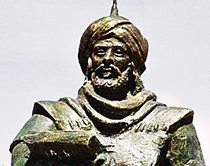
Battle of Vescera |
year: 682 |
| Annihilation of an Arab force in an ambush by Berbers and their Byzantine allies | ★ ★ ★ ★ ★ |
|
enemy: Arabs
|
location: At Thabudeos, a Roman colony south of Vescera, present-day Biskra - Algeria
|
accuracy:
●●●●●
|
|
battle type: Ambush |
war: Muslim Conquest of North Africa |
modern country:
Algeria |
| ▼ The Byzantines(emperor: Constantine IV) | ▼ The Enemies | |
| Commander: | Caecilius (Berber king) | Uqba ibn Nafi |
| Forces: | 5,000 | less than 10,000 |
| Losses: | annihilated |
| Background story: |
| The Exarchate of Africa (basically part of present-day Tynisia ) has been established since circa 590. For some time the Arabs (who had prevailed in Egypt since the 640s) did not advance to the west (apart for the occasional raids) and the exarchate together with their vassal Berber kingdoms continued to exist. In 682, Uqba ibn Nafi ruler (and founder) of Kairouan led an Umayyad Arab army of 10,000 in an expedition across north Africa, eventually reaching the Atlantic Ocean and marching as far south as the Draa and Sous rivers. The expedition of Uqba had been legendary because it was the beginning of the Arab conquest of the rest of North Africa. |
The Battle: |
 Uqba ibn Nafi Uqba was killed. That was the end of a famous warrior Arab sources report that the allied forces under Caecilius were 5,000 men while the force of Uqba has been reduced to 300. This, most probably is not accurate given that the Arabian historians had a tendency to downplay the achievements of their enemies. |
Noteworthy: |
| This was a rather minor battle for Byzantium but is considered a major event in the history of the Arab conquest, while Uqba ibn Nafi is honored as a legendary figure. Edward Gibson called him the “Conqueror of Africa”. |
Aftermath: |
| After Uqba’s death, his armies retreated from Kairouan. Which Caecilius took as his capital. The crushing defeat kept the Arabs away for another 10 years. However, they prevailed in the entire North Africa by the end of the 7th century. |
|
|
